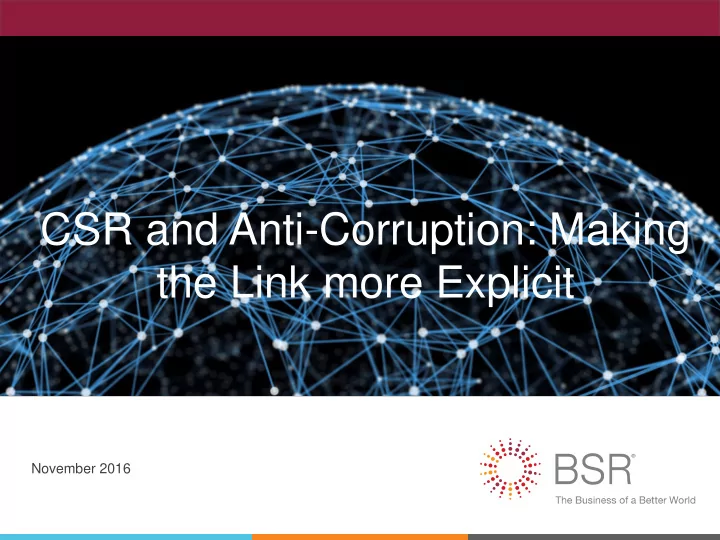

CSR and Anti-Corruption: Making the Link more Explicit November 2016
Our Mission Our mission is to work with business to create a just and sustainable world. We envision a world in which everyone can lead a prosperous and dignified life within the boundaries of the Earth’s natural resources.
Global Nonprofit Business Network We are a global nonprofit organization that works with our network of more than 250 member companies to build a just and sustainable world. From our offices in Asia, Europe, and North America, we develop sustainable business strategies and solutions through consulting, research, and cross-sector collaboration. Copenhagen Paris New York San Francisco Shanghai Tokyo Guangzhou Hong Kong 8 75 100 250 + + + GLOBAL MEMBER PROJECT OFFICES LOCATIONS STAFF COMPANIES 3 3
Corporate anti-corruption approaches must evolve There is an established consensus on best practice for managing anti-corruption compliance programs, but many questions over how well this is working in practice. Consideration of corporate culture and corruption impacts are the new frontiers of innovation. Commitment from senior management Incentives and Code of conduct and disciplinary Top-level policies measures commitment Monitoring Proportionate and review procedures Best Confidential reporting Oversight, autonomy Practice and investigation and resources Culture, Risk communication Assessment and training Due diligence and screening Training and Risk assessment continuing advice UK Adequate Procedures US FCPA Compliance Principles Third party due diligence 4
Business ethics means going beyond compliance There is a lack of alignment on thinking, messaging and approaches to business ethics in most organizations today. There is need to go beyond compliance and consider wider ethical conduct and relationships with the community. Sustainability & Ethics & CSR Compliance • Sustainability reporting • Bribery • Responsible sourcing • Money laundering • Stakeholder engagement • Sanctions • Community relations • Conflicts of interest • Human rights impacts • Corporate governance • Carbon emissions • Health and safety • Water and biodiversity • Whistleblowing and • Circular economy grievances • Environmental • Reporting responsibility • Training • ESG risk What would an integrated • Auditing and monitoring • Labor and worker rights, • Investigations approach to business ethics look trafficking, slavery • Disciplinary systems like? • Diversity and inclusion • Women’s empowerment • Inclusive economies 5
The relationship between business and communities is evolving rapidly Increased expectations on Technology enabling new corporate kinds of interaction with transparency and broader range of Collapsing public ethics stakeholders, and (and employee?) stakeholder relationships trust in business with each other and government Growing role of Mounting business in economic, Companies sustainability social, political and investor and interest in ESG environmental factors challenges Response Need for more collaborative, inclusive, and deeper engagement with society? 6
This is driving a new focus on stakeholder and community engagement • Rise of hyper-transparency as a focus for civil society and a values system has brought a new whistleblowing model of vast data leaks • Developments in open data and involvement by society in ensuring government is clean and benefits are shared throughout society • Global/local distinctions are melting away , with ‘local’ problems being adopted by global civil society organizations and vice versa • This signals a fundamental shift in the terms and conduct of stakeholder engagement • Increase in complexity of stakeholder relationships and management, including expectations • Transparency, timeliness and accountability are now fundamental operating principles for a responsible company • Enhanced understanding of impacts of companies, industries, and specific projects and companies’ understanding of stakeholders interests, demands, networks • Increase in the number (and effectiveness?) of communication and other engagement channels • Increase in potential impact/risk that stakeholders pose to companies • Greater transparency into supply chain operations and global interconnectivity 7
Ethics and compliance needs to align with CSR • CSR programs can increase corruption by directing resources to the most powerful and loudest stakeholder voices, or, they can bolster inclusivity, engagement and collaboration, which reduces risk in turn • Key to this is an understanding of both CSR and corruption in the context of relationship with the community and society • Greater focus on expanding the types of stakeholders engaged (non-traditional), prioritizing across issues and networks, understanding their needs and interests • Increase in investment in the most important stakeholders and issues, as well as the training of staff (all are ambassadors now) • Establish internal framework for ensuring alignment across engagement touchpoints and space and time • Incorporate stakeholder engagement processes and outcomes into strategic business planning and implementation Engagements drive value though new insights or through results that companies cannot achieve on their own Multi-level engagement on material issues at market, regional, and HQ levels • Grievance mechanisms must be anonymous, available and in line with international human rights best practice – if implemented properly, they can be of huge assistance in helping companies identify and address corruption risk 8
Conclusions • Pressure on business to address ethical questions is set to increase, perhaps dramatically • The discourse of CSR and sustainability has lacked an explicit focus on ethics, but this is changing • Ethics and compliance teams have expanded power , responsibility, liability • The future might see greater focus on: • Increasing coalescence around human rights, transparency and environmental justice • Collaboration for systemic change via business, society and government networks • Diagnosis and analysis of organizational culture • Greater alignment between commercial and oversight functions on strategy, goals and incentives • More structured thinking on stakeholder trust 9
Thank You! Alison Taylor, Director, Advisory Services ataylor@bsr.org 10
Recommend
More recommend